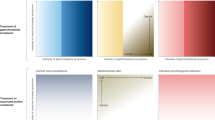Abstract
Previous reviews have highlighted complementary and alternative medicine therapies that are used to treat irritable bowel syndrome (IBS) based on published clinical trial data. Here the author describes and comments on a number of potentially relevant factors that have been commonly emphasized by practitioners who treat IBS and patients who have the disease. They include gluten and other food allergies, the candida syndrome and biofilm, interference fields and post-infectious IBS, as well as mind-body factors.
Similar content being viewed by others
References
Mertz HR. Irritable bowel syndrome. N Engl J Med 2003;349:2136–2146.
Shen YA, Nahas R. Complementary and alternative medicine for treatment of irritable bowel syndrome. Can Fam Physician 2009;55:143–148.
Hussain Z, Quigley EMM. Systematic review: complementary and alternative medicine in the irritable bowel syndrome. Aliment Pharmacol Ther 2006;23:465–471.
Zhang SS. Thinking and strategy on the diagnosis and treatment of functional gastrointestinal disorders with integrative medicine. Chin J Integr Med 2009;15:83–85.
Pan F, Zhang T, Zhang Y, Xu J, Chen F. Effect of Tongxie Yaofang Granule in treating diarrhea-predominate irritable bowel syndrome. Chin J Integr Med 2009;15:216–219.
Atkinson W, Sheldon TA, Shaath N, Whorwell PJ. Food elimination based on IgG antibodies in irritable bowel syndrome: a randomised controlled trial. Gut 2004;53:1459–1464.
Schulze J, Sonnenborn U. Yeasts in the gut: from commensals to infectious agents. Dtsch Arztebl Int 2009;106:837–842.
Thabane M, Marshall JK. Post-infectious irritable bowel syndrome. World J Gastroenterol 2009;15:3591–3596.
Dosch JP. Manual of neural therapy according to Huneke. New York: Thieme; 2007.
Webb AN, Kukuruzovic RH, Catto-Smith AG, Sawyer SM. Hypnotherapy for treatment of irritable bowel syndrome. Cochrane Database Syst Rev 2007;4:CD005110.
Zijdenbos IL, de Wit NJ, van der Heijden GJ, Rubin G, Quartero AO. Psychological treatments for the management of irritable bowel syndrome. Cochrane Database Syst Rev 2009;1:CD006442.
Lhmann C, Röhricht F, Sauer N, Noll-Hussong M, Ronel J, Henrich G, et al. Functional relaxation as complementary therapy in irritable bowel syndrome: a randomized, controlled clinical trial. J Altern Complement Med 2010;16:47–52.
Quigley EMM, Flourie B. Probiotics and irritable bowel syndrome: a rationale for their use and an assessment of the evidence to date. Neurogastroenterol Motil 2007;19:166–172.
Tang ZP. Traditional Chinese medicine clinical experience of the treatment for irritable bowel syndrome. Chin J Integr Med 2009;15:93–94.
Author information
Authors and Affiliations
Corresponding author
Rights and permissions
About this article
Cite this article
Nahas, R. Irritable bowel syndrome: Common integrative medicine perspectives. Chin. J. Integr. Med. 17, 410–413 (2011). https://doi.org/10.1007/s11655-011-0759-2
Received:
Published:
Issue Date:
DOI: https://doi.org/10.1007/s11655-011-0759-2




